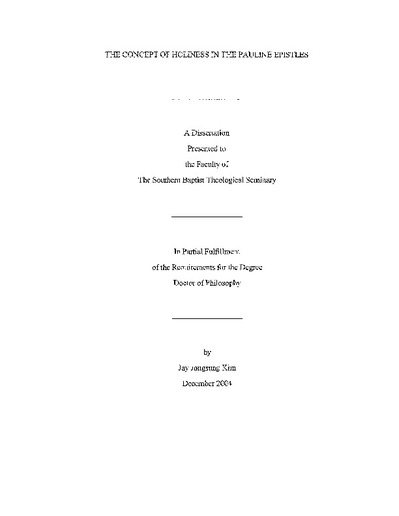The concept of holiness in the Pauline epistles
Abstract
This dissertation has attempted to define Paul's concept of holiness and how he develops and applies the concept in his letters. This task has focused on Pauline theology, conducting an in-depth exegetical study on various Pauline epistles. All texts on holiness which occur in all thirteen Pauline epistles are examined and discussed.
Chapter 1 begins with a question on how Paul, as a Pharisee, might have reevaluated the concept of holiness through the Christ event. This chapter briefly covers the history of research on the concept of holiness in Pauline epistles.
Chapter 2 surveys the Old Testament concept of holiness, focusing on the word "holiness." This survey examines the conceptual meaning of the word in the nature of God and in the ritual setting, and also the common definition for the descriptive usage in persons and things.
Chapter 3 examines the pharisaic concept of holiness, and compares this with the concept in the Old Testament.
Chapter 4 defines the concept of divine holiness. This concept is subdivided into two aspects: the holiness of God manifested in believers (Rom 6:19-22; Eph 4:24; 1 Thess 3;13; and 2 Thess 2:13), and the holiness of Christ (Rom 1:4; 1 Cor 1:30; and Col 1:9-22). For the in-depth exegetical study, Romans 6:19-22 is mainly covered.
Chapter 5 analyzes the concept of holiness in man. First, Paul's addressing believers and the church as 'holy ones' is discussed. Second, Paul's teaching on how God willed and made them to be holy (Rom 15:16; 1 Cor 1:2; 3:17; 6:11; 7:14; 2 Cor 7:1; Eph 1:4; 2:21; 5:25-27; 1 Thess 4:3-7; 5:23; and 2 Tim 2:21) is examined.
Chapter 6 observes Paul's extensive application of the word, "holy" to things other than man or God. Paul has applied the word "holy" to the Scripture (Rom 1:2), the Law (Rom 7:12), the living sacrifice (Rom 12:1), human body and spirit (1 Cor 7:34), kiss (Rom 16:16; 1 Cor 16:20; 2 Cor 13:12; and 1 Thess 5:26) and God's created foods (1 Tim 4:4-5). Finding the descriptive meaning of the word "holy" has focused so that the common understanding of the concept may be derived for the extensive usage.
Chapter 7 concludes with the summary of the concept of holiness. Further research has been suggested for possible implications in Paul's overall theological thought.
This work suggests that through the Christ event, Paul has reevaluated the concept, especially from his Pharisaic understanding. For Paul, God's holiness is one of the most important of the divine attributes along with righteousness, love, and faithfulness, and he assumed this for his preaching and teaching as a foundational factor. Paul refers to either divine holiness that has been manifested to believers through Christ or the holiness accomplished in believers through divine activity. He states that believers are established without blame, salvation has been secured, and a new humanity has been created in the likeness of God. He exhorts believers to pursue a life of holiness, demonstrating and perfecting holiness as they reflect God's moral purity in their lives and hearts.

